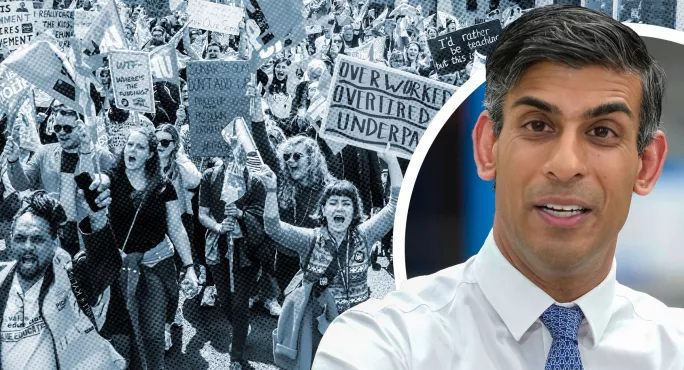Sunak warned 6.5% pay rise for teachers is ‘bare minimum’

The prime minister, Rishi Sunak, has been warned that a 6.5 per cent pay rise for teachers is the “bare minimum” that is needed.
Union leaders have also told Mr Sunak that any rejection of the independent pay review body’s recommendations will “simply embolden teachers to vote for further strike action”.
And the government is facing calls to explain what steps it has taken taken to establish how the pay body’s findings were leaked into the public domain.
It follows reports over the weekend in The Times that the prime minister was prepared to block the recommendations over concerns about stoking inflation.
- NEU: Teachers to strike for 2 further days next month
- Teacher strikes: NEU challenged over ‘devastating’ dates clash
- Teacher strikes: Unions urge new pay talks after 6.5% leak
Education unions wrote to the education secretary, Gillian Keegan, last month after reports emerged that the independent School Teachers’ Review Body (STRB), which makes recommendations on teacher pay, had advised that teachers should receive a 6.5 per cent pay increase for 2023-24.
Yesterday, Mr Sunak told the BBC’s Sunday With Laura Kuenssberg: “When it comes to public sector pay, I’m going to do what I think is affordable, what I think is responsible.”
He added that while such a move “may not always be popular in the short term”, it was “the right thing for the country”.
And Mr Sunak’s chief secretary to the Treasury also stressed that ministers would consider “the implications for inflation” when deciding on public sector workers’ pay.
John Glen told Sky News’ Sophy Ridge On Sunday show: “Obviously, I’m very aware of the massive contribution that teachers, nurses and public sector workers make, and we’ve got to get the right outcomes that are fair to them but also aren’t inflationary.”
In response, Julie McCulloch, director of policy at the Association of School and College Leaders, said: “The government has frequently said that it follows the recommendations of independent pay review bodies.”
Ms McCulloch said the STRB recommendation would have been made “on the basis of what is needed in terms of the recruitment and retention of teachers”.
She added: “If we do not have that award as a bare minimum of what is required to shore up the desperate shortage of teachers, we will end up in a situation where it is literally impossible to put qualified teachers in front of classes.
“Surely no government can oversee such a situation and we implore the prime minister to act responsibly.”
Meanwhile, Kevin Courtney, joint general secretary of the NEU teaching union, said: “The government is laying the groundwork for a further real-terms pay cut, and one that flies in the face of the recommendations of the pay review body.”
The NEU is currently re-balloting members over pay to extend the legal mandate for strike action into next term.
Reflecting on the vote, Mr Courtney said: “If it is true that the prime minister intends to renege on his position that review body advice must be adhered to, then this will simply embolden teachers to vote for further strike action.
Last weekend, England’s largest teaching union announced two more days of national strike action - on Wednesday 5 and Friday 7 July - after the education secretary declined to restart negotiations on pay.
Dr Patrick Roach, general secretary of the teaching union NASUWT, said: “If the government chooses to ignore the recommendations of the pay review body, this will have profound consequences for future industrial relations, with industrial action likely in the autumn.”
Today, Dr Roach also wrote to the education secretary repeating his previous request that she confirm the actions taken to identify how and why the content of the STRB’s report were leaked to the press.
He also hit out at the “comments and speculation” on pay review bodies by both the media and the government that he said were “threatening to bring the pay review body process into disrepute”.
He said it was “imperative” that Ms Keegan “bring an end to the damaging speculation and publish immediately the 33rd report of the STRB, without further delay, to allow all other statutory consultees to review in full the contents of that report”.
Paul Whiteman, general secretary of school leaders’ union NAHT, said: “If the reports are true, hard-working teachers and leaders can only conclude that they are considered worthless by this government.
“The government’s contempt for the profession and incompetence in negotiations will be plain to see. Failing to settle matters at the negotiating table, the secretary of state said it’s now up to the STRB, refusing to come back to the table, confident in her gamble that the STRB would recommend less. That judgement has backfired and to not follow through on the STRB’s recommendation will betray children.”
A Department for Education spokesperson said: “Further strike action will cause real damage to pupil learning and even more disruption for parents right across the country. Thousands of schools are receiving significant additional funding as part of the extra £2bn of investment we are providing for both 2023/24 and 2024/25 which will take school funding its highest level in history next year, as measured by the IFS.
“As part of the normal process, the independent School Teachers’ Review Body has submitted its recommendations to government on teacher pay for 2023/24. We will be considering the recommendations and will publish our response in the usual way.”
Register with Tes and you can read two free articles every month plus you'll have access to our range of award-winning newsletters.



